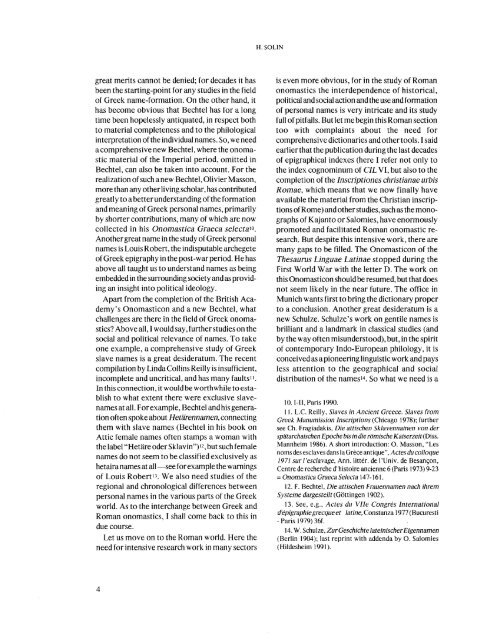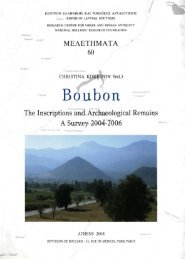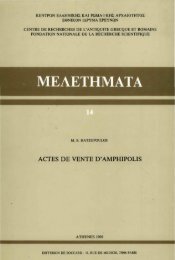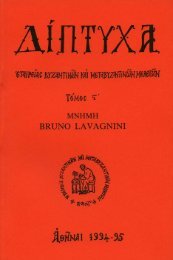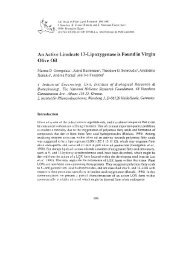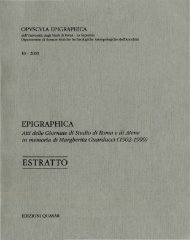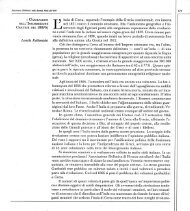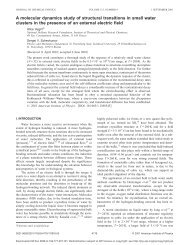Roman onomastics in the Greek East: social and political aspects ...
Roman onomastics in the Greek East: social and political aspects ...
Roman onomastics in the Greek East: social and political aspects ...
Create successful ePaper yourself
Turn your PDF publications into a flip-book with our unique Google optimized e-Paper software.
great merits cannot be denied; for decades it has<br />
been <strong>the</strong> start<strong>in</strong>g-po<strong>in</strong>t for any studies <strong>in</strong> <strong>the</strong> field<br />
of <strong>Greek</strong> name-formation. On <strong>the</strong> o<strong>the</strong>r h<strong>and</strong>, it<br />
has become obvious that Bechtel has for a long<br />
time been hopelessly antiquated, <strong>in</strong> respect both<br />
to material completeness <strong>and</strong> to <strong>the</strong> philological<br />
<strong>in</strong>terpretation of <strong>the</strong> <strong>in</strong>dividual names. So, we need<br />
a comprehensive new Bechtel, where <strong>the</strong> onomastic<br />
material of <strong>the</strong> Imperial period, omitted <strong>in</strong><br />
Bechtel, can also be taken <strong>in</strong>to account. For <strong>the</strong><br />
realization of such anew Bechtel, Olivier Masson,<br />
more than any o<strong>the</strong>r liv<strong>in</strong>g scholar, has contributed<br />
greatly to abetter underst<strong>and</strong><strong>in</strong>g of <strong>the</strong> formation<br />
<strong>and</strong> mean<strong>in</strong>g of <strong>Greek</strong> personal names, primarily<br />
by shorter contributions, many of which are now<br />
collected <strong>in</strong> his Onomastica Graeca se/ecfa 10 .<br />
Ano<strong>the</strong>r great name <strong>in</strong> <strong>the</strong> study of <strong>Greek</strong> personal<br />
names is Louis Robert, <strong>the</strong> <strong>in</strong>disputable archegete<br />
of <strong>Greek</strong> epigraphy <strong>in</strong> <strong>the</strong> post-war period. He has<br />
above all taught us to underst<strong>and</strong> names as be<strong>in</strong>g<br />
embedded <strong>in</strong> <strong>the</strong> surround<strong>in</strong>g society <strong>and</strong> as provid<strong>in</strong>g<br />
an <strong>in</strong>sight <strong>in</strong>to <strong>political</strong> ideology.<br />
Apart from <strong>the</strong> completion of <strong>the</strong> British Academy's<br />
Onomasticon <strong>and</strong> a new Bechtel, what<br />
challenges are <strong>the</strong>re <strong>in</strong> <strong>the</strong> field of <strong>Greek</strong> <strong>onomastics</strong>?<br />
Above all, I would say, fur<strong>the</strong>r studies on <strong>the</strong><br />
<strong>social</strong> <strong>and</strong> <strong>political</strong> relevance of names. To take<br />
one example, a comprehensive study of <strong>Greek</strong><br />
slave names is a great desideratum. The recent<br />
compilation by L<strong>in</strong>da Coll<strong>in</strong>s Reilly is <strong>in</strong>sufficient,<br />
<strong>in</strong>complete <strong>and</strong> uncritical, <strong>and</strong> has many faults".<br />
In this connection, it would be worthwhile to establish<br />
to what extent <strong>the</strong>re were exclusive slavenames<br />
at all. For example, Bechtel <strong>and</strong> his generation<br />
often spoke about Hetärennamen, connect<strong>in</strong>g<br />
<strong>the</strong>m with slave names (Bechtel <strong>in</strong> his book on<br />
Attic female names often stamps a woman with<br />
<strong>the</strong> label "Hetäre oder Sklav<strong>in</strong>") 12 , but such female<br />
names do not seem to be classified exclusively as<br />
hetaira names at all —see for example <strong>the</strong> warn<strong>in</strong>gs<br />
of Louis Robert 13 . We also need studies of <strong>the</strong><br />
regional <strong>and</strong> chronological differences between<br />
personal names <strong>in</strong> <strong>the</strong> various parts of <strong>the</strong> <strong>Greek</strong><br />
world. As to <strong>the</strong> <strong>in</strong>terchange between <strong>Greek</strong> <strong>and</strong><br />
<strong>Roman</strong> <strong>onomastics</strong>, I shall come back to this <strong>in</strong><br />
due course.<br />
Let us move on to <strong>the</strong> <strong>Roman</strong> world. Here <strong>the</strong><br />
need for <strong>in</strong>tensive research work <strong>in</strong> many sectors<br />
4<br />
H. SOLIN<br />
is even more obvious, for <strong>in</strong> <strong>the</strong> study of <strong>Roman</strong><br />
<strong>onomastics</strong> <strong>the</strong> <strong>in</strong>terdependence of historical,<br />
<strong>political</strong> <strong>and</strong> <strong>social</strong> action <strong>and</strong> <strong>the</strong> use <strong>and</strong> formation<br />
of personal names is very <strong>in</strong>tricate <strong>and</strong> its study<br />
full of pitfalls. But let me beg<strong>in</strong> this <strong>Roman</strong> section<br />
too with compla<strong>in</strong>ts about <strong>the</strong> need for<br />
comprehensive dictionaries <strong>and</strong> o<strong>the</strong>r tools. I said<br />
earlier that <strong>the</strong> publication dur<strong>in</strong>g <strong>the</strong> last decades<br />
of epigraphical <strong>in</strong>dexes (here I refer not only to<br />
<strong>the</strong> <strong>in</strong>dex cognom<strong>in</strong>um of CIL VI, but also to <strong>the</strong><br />
completion of <strong>the</strong> Inscrìptiones chrìstianae urbis<br />
Romae, which means that we now f<strong>in</strong>ally have<br />
available <strong>the</strong> material from <strong>the</strong> Christian <strong>in</strong>scriptions<br />
of Rome) <strong>and</strong> o<strong>the</strong>r studies, such as <strong>the</strong> monographs<br />
of Kajanto or Salomies, have enormously<br />
promoted <strong>and</strong> facilitated <strong>Roman</strong> onomastic research.<br />
But despite this <strong>in</strong>tensive work, <strong>the</strong>re are<br />
many gaps to be filled. The Onomasticon of <strong>the</strong><br />
Thesaurus L<strong>in</strong>guae Lat<strong>in</strong>ae stopped dur<strong>in</strong>g <strong>the</strong><br />
First World War with <strong>the</strong> letter D. The work on<br />
this Onomasticon should be resumed, but that does<br />
not seem likely <strong>in</strong> <strong>the</strong> near future. The office <strong>in</strong><br />
Munich wants first to br<strong>in</strong>g <strong>the</strong> dictionary proper<br />
to a conclusion. Ano<strong>the</strong>r great desideratum is a<br />
new Schulze. Schulze's work on gentile names is<br />
brilliant <strong>and</strong> a l<strong>and</strong>mark <strong>in</strong> classical studies (<strong>and</strong><br />
by <strong>the</strong> way often misunderstood), but, <strong>in</strong> <strong>the</strong> spirit<br />
of contemporary Indo-European philology, it is<br />
conceived as a pioneer<strong>in</strong>g l<strong>in</strong>guistic work <strong>and</strong> pays<br />
less attention to <strong>the</strong> geographical <strong>and</strong> <strong>social</strong><br />
distribution of <strong>the</strong> names 14 . So what we need is a<br />
10.1-II, Paris 1990.<br />
11. L.C. Reilly, Slaves <strong>in</strong> Ancient Greece. Slaves from<br />
<strong>Greek</strong> Manumission Inscriptions (Chicago 1978); fur<strong>the</strong>r<br />
see Ch. Fragiadakis, Die attischen Sklavennamen von der<br />
spätarchaischen Epoche bis <strong>in</strong> die römische Kaiserzeit (Diss.<br />
Mannheim 1986). A short <strong>in</strong>troduction: Ο. Masson, "Les<br />
noms des esclaves dans la Grèce antique", Actes du colloque<br />
1971 sur l'esclavage, Ann. littér. de l'Univ. de Besançon,<br />
Centre de recherche d'histoire ancienne 6 (Paris 1973) 9-23<br />
= Onomastica Graeca Selecta 147-161.<br />
12. F. Bechtel, Die attischen Frauennamen nach ihrem<br />
Systeme dargestellt (Gött<strong>in</strong>gen 1902).<br />
13. See, e.g., Acres du Vile Congrès International<br />
d'épigraphiegrecque et lat<strong>in</strong>e, Constanza 1977 (Bucuresti<br />
-Parisi 979) 36f.<br />
14. W. Schulze, Zur Geschichte late<strong>in</strong>ischer Eigennamen<br />
(Berl<strong>in</strong> 1904); last repr<strong>in</strong>t with addenda by Ο. Salomies<br />
(Hildesheim 1991).


